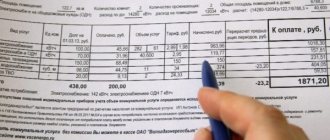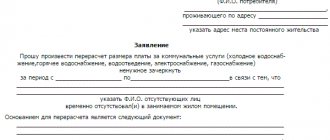Home » Housing disputes » Payment of utilities for shared ownership
37
There is a misconception that utility bills are charged for the entire apartment and therefore, even if one of the residents does not pay, this amount is distributed to the other owners. In fact, no one can force a person to pay utility bills that he has nothing to do with.
Law on payment of utilities by participants in common property
Russian legislation ensures that co-owners of shares in residential real estate are responsible for the maintenance and preservation of this housing. They are obliged to pay utility bills on personal accounts and the debts that arise on them.
Moreover, the responsibility for maintaining the property falls on the shoulders of each owner, in accordance with the size of the share (Article 249 of the Civil Code of the Russian Federation).
Let us list other legal acts, according to which, payment of utilities and other expenses associated with the maintenance and preservation of shared property will be borne by all participating owners of such housing:
- Article 30 of the Housing Code of the Russian Federation. It stipulates the responsibility of the owners for the maintenance of common property and payment of common house expenses, all rights and obligations.
- Article 153 of the RF Housing Code. It talks about the obligation of owners to pay for consumed utilities in full within the allotted time.
- Article 155 of the RF Housing Code contains a list of services that are subject to payment.
- Article 210 of the Civil Code of the Russian Federation says that the owner bears the burden of maintaining the property he owns, unless otherwise provided by agreement or law.
- Article 249 of the Civil Code of the Russian Federation fixes the obligation to pay all expenses associated with the maintenance of property.
Please note that non-use of the premises by the owners is not a valid reason for non-payment of housing and communal services. This is stated in Article 155 of the RF Housing Code.
Determining the procedure for paying utility bills in shared ownership
The obligation to pay for utilities is specified in Articles 30 and 153 of the RF Housing Code. Regardless of who exactly lives in the apartment/room (the owner or the tenant), he is obliged to pay utility bills on time and in full. Moreover, even if a person does not actually live in the apartment/room in question, he is still required to pay for utilities.
Regardless of the amount of debt for utility bills, it is impossible to evict a tenant-owner of a share except by a court decision. Alternatively, you can buy out the share forcibly if it is insignificant, but this does not always work. But for utility debts, you can easily evict a tenant, because the lease agreement usually states an obligation to pay for such services.
Payments for shared ownership
Most often, the problem arises if the apartment is in shared ownership. Such a procedure for owning real estate implies the need to bear responsibility for housing exactly to the extent that a person owns.
Example: In case of common joint ownership, if such a need arises, all residents are obliged to pay for utilities equally. For example, if the payment amount is 5 thousand rubles, and 5 people live in an apartment, then each of them must pay 1 thousand rubles. With shared ownership, the amount depends on the size of the property. For example, if a person owns a share of 1/10 of an apartment, then he should pay only 1/10 of the utility bills and no more.
Recalculation of payments
Based on RF PP No. 307, any owner of real estate (including shares) has the right, if he does not live in the premises for a long time (or does not live in principle and does not rent it out), to apply for a recalculation of payments. Thanks to such a system, you can save significantly and avoid the occurrence of serious debt and, as a result, possible problems with co-owners.
Procedure
- Prepare documents proving the fact that the person does not live in his share of the apartment. Among them there should be documents stating that the same owner lives in another place and regularly pays for utilities there.
- Prepare an application for recalculation (see sample below).
- Send documents and application to the management company (management company).
- Wait for recalculation and pay for services according to the new conditions.
Documentation
An approximate list of documents for recalculation:
- Documents confirming the fact that a citizen is undergoing treatment in a sanatorium, on a business trip, a tourist trip, and so on.
- Tickets for train, plane, etc.
- Bills from hotels, motels, hostels.
- Certificate of temporary registration at another address.
- Receipts for payment of utility bills at another address.
For obvious reasons, management companies do not want to reduce their income and therefore are extremely reluctant to agree to recalculation. If you refuse, you can try to get your way through the court, but without an experienced lawyer this will be very difficult to do.
Application for recalculation
Usually the application is filled out on the spot, when submitting documents. There is no strict need to prepare it in advance.
Deadlines
Review of such applications takes about 5 days. If there is no answer within this period, you can go to the Criminal Code and clarify the fate of the document, but there is no point in swearing or demanding to work faster since strict deadlines are not established by law. But if the delay is too significant (for example, 1 month or more), you can go to court and attach to the claim your copy of the application with a note about filing with the Criminal Code.
Penalty for non-payment of utilities
Failure to pay or untimely payment of utility bills involves the accrual of a penalty in the amount of 1/300 of the refinancing rate of the Central Bank of the Russian Federation (clause 14, article 155 of the Housing Code of the Russian Federation). As of 01.2020, the refinancing rate is 6.25%. Thus, 1/300 part is approximately 0.021% per day.
However, penalties are not assessed immediately, but rather 31 days after the payment deadline has arrived. From this moment on, a penalty in the specified amount will be charged on the debt for 90 days. Starting from 91 days, the penalty amount will increase to 1/130 of the refinancing rate (0.060%)
Agreement between the parties to pay for housing and communal services - is it necessary to go to court?
Shares in property rights can be established by a settlement agreement or a court decision (Article 244 of the Civil Code of the Russian Federation). According to the prescribed conditions, participants in shared property must be responsible for it, including fulfilling obligations to make timely payments for utility debts.
- Any participant in shared property may demand through the court to conclude an agreement on the procedure for paying for utility services, in proportion to each person’s share.
- But there is no need to go to court. If the parties can agree, then it is enough to go to a notary and draw up the agreement in documentary form.
If the owners cannot come to a mutual decision—for example, if one insists that he does not live in the property—then it is worth resolving the issue through the courts.
After you have the agreement in your hands, you must send it to the provider of housing and communal services, the management organization, and the companies with which the agreement was concluded with the original owner.
The agreement should be accompanied by a statement written jointly by all owners. It must indicate a request to make charges, in accordance with the new conditions fixed in the agreement, and to issue each owner with their own payment receipt.
The management company has the right:
- Divide personal accounts, make each owner their own account. Everyone will be sent their own receipts.
- Do not divide personal accounts, but issue separate receipts. We will talk about this below.
This method of payment for services allows you to balance the rights of each participant in shared ownership, and force those who ignore the legal requirements of housing and utility companies to pay utility bills.
It may be suitable both for citizens who were able to come to an agreement (after all, an agreement can be drawn up without a trial), and for those who have been fighting for the division of financial responsibility for common property for many years (in this case, only the court will help).
By the way , a representative of the Management Company or a housing and communal services organization, or the owner himself, whose rights have been infringed, can file for collection of a utility debt.
Divide your personal account for utility bills
The mechanism for dividing a personal account is quite clearly regulated in the case where the housing is privatized. If it comes to living in a municipal apartment under a social tenancy agreement, significant difficulties can often arise. Therefore, in most cases, it is recommended to first privatize housing, and only then deal with the division of the personal account.
This point, namely the need for preliminary privatization of housing, is very important. In practice, you can often encounter a situation where litigation between people living in the same apartment under a valid social tenancy agreement drags on for years. In this case, one authority replaces another, and interpretations can acquire exactly the opposite meaning. This is largely due to the lack of elaboration of the issue in current legal acts.
Bill sharing, from a legal point of view, means allocating a share of the payment to other residents, when each citizen independently contributes a share of utility costs. In this case, the section of the bill implies that the service provider allocates separate receipts for its services. At the same time, the legal status of housing does not change, and the form of ownership does not change.
Section of personal accounts, or what are separate utility payments
Participants in common shared property can divide personal accounts. Then each owner will be able to receive his own utility bill - and pay exactly as much as he consumes, or as much as is calculated, in proportion to his share for the common squares.
The procedure for separating accounts can take place in several stages, depending on the circumstances and the specific situation:
Stage 1. Appeal to all owners with a request to pay utility debts or pay payments in proportion to their share of rights.
Stage 2. Sending a written request to all participants in shared ownership.
Stage 3. Contacting the Management Company or organization responsible for the supply of housing and communal services. You should prepare a written statement requesting to split your personal account. Be sure to attach a document confirming ownership.
Stage 4. Go to court if the company refuses to partition you, and other owners ignore your requests. It is worth preparing a statement of claim.
Our lawyers will help you sort out the problem of dividing debts for utility bills, as well as dividing personal accounts. Their work involves providing advice on housing issues.
Based on a court decision, the management company or housing and communal services organization must divide the personal account. The best option is when each owner gets their own account and receives individual receipts. Thus, each owner will pay utility bills only in his own name.
In some cases, the bill may not be divided, but different receipts are sent for each owner. This is possible without going to court if the owners have reached a mutual decision and do not refuse to pay utility bills.
Sharing a joint account
If the apartment belongs to people on the basis of joint ownership, then the residents must decide on their own questions about the algorithm for paying for utilities. It is better for persons who are not related to each other to immediately determine the procedure for dividing the amount by concluding an agreement.
In order to insure oneself against being brought to civil liability due to failure to fulfill obligations by other tenants or owners, the tenant should immediately contact the management company with an application for splitting the account. This human right is specified in Article 249 of the Civil Code of the Russian Federation[1]. An application for the allocation of a check is drawn up in accordance with the requirements of the Legislation of the Russian Federation. It should have a clear structure:
- Introductory part. The water part contains information about the management company, the applicant and the name of the document. Information about the management company and the applicant is indicated in the upper right corner of the document. And its name is written in the middle.
- Descriptive and motivational. Here the person writes down information about the property, other residents, as well as the size of his share. The applicant also makes references to regulatory legal acts.
- Requirement to provide separate settlement documents. In this case, each person occupying the property will have a separate personal account, but for the division it will be necessary to find out the exact size of the shares of each tenant.
The following copies of documents must be submitted along with the letter:
- agreement concluded with housing and communal services;
- real estate documents indicating the size of each person's parts;
- ID cards.
In this case, all users are required to submit a similar appeal or sign a joint statement. Without the consent of the owners, the payment receipt for utility bills in shared ownership will be generalized. If all payers agreed and completed the actions that are required of them, then the next month after the citizen’s appeal, the Criminal Code is obliged to issue each person a separate receipt.
Ignoring a written appeal or inaction of officials can be appealed to the State Housing Inspectorate, Rospotrenadzor, and the Prosecutor's Office.
Enforcement measures against a participant in shared ownership for non-payment of utilities and taxes
Representatives of housing and utility companies can influence property owners to ensure that they pay utility bills on time and monitor the maintenance of housing.
Measures of influence on participants in shared ownership may be as follows:
- Warnings, notices, alerts, debtor list signs.
- Calculation of penalties on the total amount of debt. The percentage is equal to 1/300 of the refinancing rate of the Central Bank of the Russian Federation.
- Disabling service or limiting supply from a utility resource. The company has the right to turn off electricity, water, and gas if the owner has a large debt. Please note that in Russia the practice of disconnecting is very popular, even for late or non-payment of 2000-3000 rubles. the supply of the service may be restricted to you.
- Debt collection through court. The management company or service provider can sue a court of general jurisdiction and demand payment of utilities from each owner.
- Eviction. We will talk about this measure in more detail below.
The owner himself can recover paid utilities and other expenses from other shareholders. But, unfortunately, if he does not pay the debt and does not comply with the court decision, you are unlikely to impose a fine on him. This will already be the work of bailiffs. They will impose a fine for non-fulfillment of their demands at the expense of the state treasury, and not at the expense of the plaintiff owner.
Applying to the court for the division of utilities and payments related to the maintenance and preservation of property
The owner of a share in the common property can pay for the utilities himself - and then recover part of it through the court from other homeowners. For example, if an apartment is divided between two citizens, then he can recover half of the expenses incurred.
This applies not only to utility bills for electricity, gas, water, but also to expenses for common property, major repairs, replacement of meters, verification of equipment, etc.
Which court should I go to?
- If the amount of the claim is less than 50,000 rubles, then the application is submitted to the World Court.
- If the amount of the claim is more than 50,000 rubles, then go to the District Court.
- Claims to determine the procedure for paying rent that are not subject to assessment are within the jurisdiction of the District Court.
- You should apply to the court at the defendant’s place of residence.
- If the debt does not exceed 500,000 rubles, the case is considered in the order of writ proceedings.
- In cases where the Magistrate returned the claim on the basis of Part 3 of Article 125 of the Code of Civil Procedure or the Order was cancelled, the case will be considered in the manner of claim or summary proceedings.
Deadline
Utility costs and other costs of maintaining the property can only be recovered for the last 3 years.
That is, if you go to court for the division of communal services in June 2021, then the calculation should be made from June 2021 to June 2021.
Division of the cost of utilities in court
If the management organization ignored the appeal, or if the co-owners could not reach an agreement, then the procedure for paying utility bills for common property is determined by the court.
To do this, one or all owners file a claim. A civil case is considered within 2 months. In practice, the court always satisfies the applicant’s demands, regardless of the will of the co-owners.
However, there are situations when claims cannot be satisfied if:
- The property was issued by the employer organization.
- The residential premises have been foreclosed on.
- The residential premises are not privatized.
- In cases provided by law.
The judge determines the parts of the property of each owner and delineates the obligations of all owners regarding compensation for utility services, repair and maintenance of the railway.
Eviction from shared ownership - is it possible and in what cases?
In accordance with Article 3 of the Housing Code of the Russian Federation, no one has the right to evict the owner of shared real estate for non-payment of utilities and other payments.
In addition, no one can restrict the rights to receive housing and communal services, other than authorized persons of the management company.
Management company employees cannot evict the owner from his home for non-payment. They may turn to other measures.
The only authorized body is .
He can evict the owner of the shared property if:
- He went missing and has been absent from housing for more than 6 months.
- The apartment is municipal property, and the owners have not paid utilities for more than six months.
The court will order eviction if there are compelling reasons for doing so. They cannot evict a citizen for non-payment of utilities , especially from his own home.
The procedure for eviction is regulated by the Housing Code of the Russian Federation in Article No. 31.
In case of refusal or evasion of execution of a court decision, eviction can be carried out with the help of bailiffs.
Recalculation in case of non-residence in the apartment
Due to the temporary absence of owners at their place of residence, a recalculation may be made. However, only for those services for which a meter has not been installed .
Reference: According to the Civil Code of the Russian Federation, absence of more than 5 full calendar days in a row is temporary. This period does not take into account the day of departure and the day of arrival.
- The owner of the property must contact the management company or the service provider organization and notify in writing of the departure for a certain period. The reason can be written down. It is better to apply before leaving, or within 30 days of arrival.
- The service provider must independently submit the result of the recalculation within 5 working days after receiving the corresponding written application.
- Documents confirming the temporary absence and its period are attached to the application.
Please note that if a participant in shared ownership plans to be absent for more than 6 months, after this period he must submit a new application for recalculation for subsequent billing periods in connection with the extension of the period of temporary absence.
If one of the owners is absent, then there is a possibility that paying for utilities will fall on the shoulders of the resident. But this is not always the case - after all, according to Russian laws, all owners are responsible for property in proportion to their shares in it. Therefore, the likelihood of being exempt from paying utility bills is completely low.











